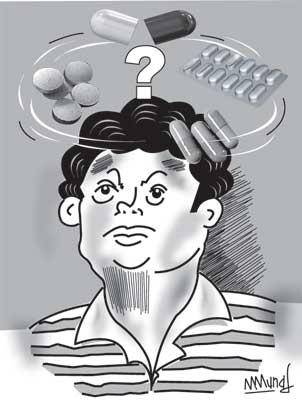
Think before you supplement
By the time this article is in print the finals of the schools Presidents Trophy will be over. In the tournament there was only one semi-final game and no quarters. With many a known teams not taking the field those that were slotted in were way behind either St Peters or Isipatana. For the record it is another successfully concluded tournament. Success means many things to different people. It means records to satisfy the sponsors or statistics to present at the next AGM. Success to others is winning and if not so to point fingers and or assault officials when everything does not go your way. With the management paying and the coaches having to perform you may have to point fingers. When ever something goes wrong the referee is to be blamed. And the often quoted statement whether at club level or school is that we spend so much so we must. When statements of this nature are made it leads me to ask a question whether this same demand is made from players? Does this lead to methods that are short term and detrimental on the long run? Will these lead to players using whatever means to achieve the end expected? Are players being advised to use what is now known and called supplements? In conditioning the athlete to improve his performance it is not only the professional who is lured by the promise of a shortcut it is therefore important to educate the young on the downside of using supplements that are expected to give a better performance; they must also be educated to understand the effects of long time use and the use without medical guidance. Walk into most fitness centres in Sri Lanka and you will see advertisements for dietary supplements. Pumping muscle lifting iron is all what some of the instructors know. They advise the student to use muscle building supplements with out knowledge of the subject of how and when to use. Spending hours in the gym or at practice which offer results may be too long a wait for you. It is at this time that the sportsman will start may be looking for fast, effective results. It is here that those who are in charge that feed the naive with hopes and short cuts. People think that taking sports supplements could improve performance without so much hard work. But do sports supplements really work? And are they safe? Sports supplements come in different forms, including vitamins, synthetic drugs, and hormones, most of which are available over the counter without a prescription. If you're thinking about using sports supplements, you're not alone. Why is the athlete driven to this situation? More often than not it is the pressure that is built within athlete to perform from parents, coaches as well as supporters and management that lead to the situation. Coaches and administrators whose intention is to justify the return against the money spent push and advise on the use of supplements without considering the long-term damaging effects. A common supplement used and advised is Creatine. There is scientific evidence that taking Creatine supplements can marginally increase athletic performance in high-intensity events but studies in swimmers and runners have been less than promising, possibly due to the weight gain. It is just not the rugby player but athletes of any sporting discipline who may be lured to use the products for enhancement. Take a look at the numbers fitness centres that are sprouting up around the country. The user in his eagerness to put on muscle may be taken up completely by what he hears from the trainers. Who knows one aspect of the use of supplements? The other effects which include stomach pain, nausea, diarrhoea and muscle cramps while high doses could lead to kidney, liver or heart problems. At the end it boils down to expectation. You as an individual must have a realistic goals. Parents Teachers and Coaches must learn not to push the player to levels that are not consistent with the individual. They should not suggest supplements when you need more performance. Stop for a moment and think of the youth and not the money spent on the sport or your job that is in balance as the performance does not justify what you are paid. Please no short cuts to ensure your job. The future of the athlete is more important. If you must recommend supplements then direct the boy to a medical specialist. |
|| Front
Page | News | Editorial | Columns | Sports | Plus | Financial
Times | International | Mirror | TV
Times | Funday
Times || |
| |
Reproduction of articles permitted when used without any alterations to contents and the source. |
© Copyright
2007 Wijeya
Newspapers Ltd.Colombo. Sri Lanka. All Rights Reserved. |
